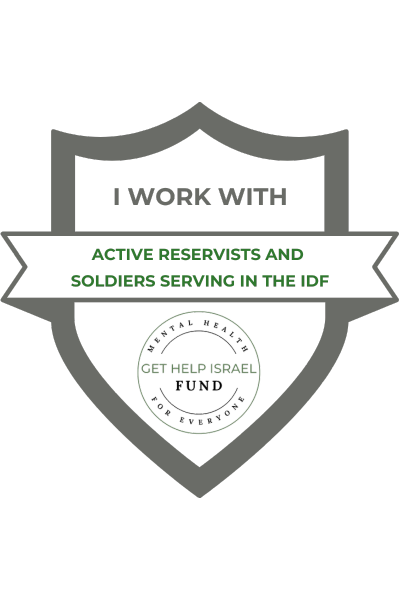Lauren Isaacs
Credentials
Finances
Licensed in Israel
- Bograshov 4
- Tel Aviv
Lauren Isaacs
 Verified
Verified
Credentials
Clinical Social Worker
LMSW
Finances
250-350 NIS
Private Insurance
Sliding Scale | Free Consultation | Student Discount | Lone Soldier Discount
Licensed in Israel
- Bograshov 4
- Tel Aviv
ABOUT
Originally from England, I am a qualified Social Worker, with vast experience working with anxiety, depression, addictions, sexual abuse/trauma, post traumatic stress disorder, mental health, loss, relationship breakdowns and aliyah related problems. On top of seven years experience in England providing therapy for children, adolescents and adults, I have spent time working in Latin America and Africa, gaining extensive skills and knowledge of diverse cultures and backgrounds. I strongly believe that my clients will always be their own expert, and it is my aim to create a safe and confidential space, in which we can explore ideas, difficulties and desires together. With the understanding that every person & situation is unique, I offer a holistic approach that utilises my skills and experience to meet the needs and goals of each individual client.
QUALIFICATIONS
LMSW
Middlesex University
2005
Degree
LMSWEducation
Middlesex UniversityYear of Graduation
2005Years in Practice
18
LICENSED IN ISRAEL
Registered Social Worker in Israel
27332
ADDITIONAL CREDENTIALS
CBT Trauma Certified 2017
DISTANCE COUNSELING
Telephone Counseling, Online Therapy
PRIMARY SPECIALTIES
Codependency
Sexual Abuse / Rape
Sexual Issues
Stress Management
Trauma / Post Traumatic Stress Disorder PTSD
ADDITIONAL SPECIALTIES
Abuse
Anxiety / Panic
Dissociative Disorders
Family Issues
Grief
Self-Esteem
Self-Harm / Suicide
Sex Therapy
CLIENT FOCUS
Population
Adolescents
Adults
Families
Men
Women
Languages
English
TREATMENT APPROACH
Attachment-Based Family Therapy (ABFT)Attachment-based family therapy (ABFT) is a form of psychotherapy that focuses on the family's relationships and communication patterns. It is based on the theory that strong and secure attachments between family members are essential for emotional health and well-being. The goal of ABFT is to identify any problems in family relationships, enable family members to become more attuned to each other’s needs, and build a secure bond between them. It also helps family members to practice healthy communication skills, learn effective problem-solving strategies, and build trust within the family.
Body-Mind PsychotherapyBody-mind psychotherapy is an integrative approach to psychological treatment that draws from both psychotherapeutic and somatic/body-based approaches. It emphasizes the interconnection between physical, emotional, cognitive and spiritual aspects of being. This approach seeks to help individuals explore how physical sensations, emotions, thoughts and beliefs influence their behavior and well-being. Through this exploration, individuals can gain insight into how the body and mind interact to create patterns of behavior, and how those patterns can be changed to promote healing and wellness.
Family Attachment Narrative TherapyFamily Attachment Narrative Therapy is a form of psychotherapy that focuses on helping individuals to develop secure, healthy attachments to their family members. This type of therapy focuses on the narrative, or stories, that individuals tell about their family relationships and how they view themselves in those relationships. Through this therapeutic process, individuals are encouraged to explore their past experiences with family members, gain a better understanding of their current family dynamics, and develop healthier, more secure attachments to their family members. Therapists using this approach believe that the caregivers are the most crucial component in the healing process, and therefore incorporate caregiver narratives as an important part of the therapeutic process in addressing and repairing the unmet needs of the client. This approach to treatment is primarily designed for children, teens, and young adults who are experiencing issues related to identity, disrupted attachment, and early childhood trauma.
Internal Family Systems (IFS)Internal Family Systems (IFS) is an evidence-based psychotherapy that uses the metaphor of an internal family of parts to help people gain awareness of how different parts of themselves can interact in healthy and unhealthy ways. IFS encourages people to become curious about their different parts, with the goal of helping them gain access to their true Self or core. Through this process, people can learn to recognize and care for the different parts of themselves, as well as develop compassionate understanding for the origins of their parts. A key principle of IFS is that each part within the person has its own positive intention and is trying to protect the person in some way. By understanding the positive intention of each part, the practitioner and client can work together to help the parts feel heard and understood, and to find more adaptive ways of meeting their needs. IFS has been found to be an effective treatment for a variety of mental health issues, including depression, anxiety, trauma, and relationship issues.
Somatic Experiencing (SE)Somatic Experiencing (SE) is a body-oriented approach to the healing of trauma and other physical and psychological stresses. It is based on the idea that the body is a powerful source of healing and that unresolved trauma can be resolved through the process of bringing awareness and attention to the physical sensations of the body. By gradually and gently guiding individuals through the sensations associated with their traumatic experience, SE can help to restore balance and well-being more quickly and effectively than traditional psychotherapy. SE utilizes the body’s natural ability to regulate and heal itself and supports individuals in developing more resilience and self-regulation. Somatic Experiencing aims to help people move past the place where they might be “stuck” in processing a traumatic event. SE is often used to treat symptoms of post-traumatic stress disorder (PTSD), anxiety, depression, and other mental health issues.
Trauma-Focused Cognitive Behavioral Therapy (TF-CBT)Trauma-Focused Cognitive Behavioral Therapy (TF-CBT) is an evidence-based practice used to help children, adolescents and their parents who have experienced a single or multiple traumatic events. This type of therapy combines cognitive and behavioral strategies to help people process their traumatic experiences, manage their distress, develop coping skills, and restore their sense of safety and well-being. TF-CBT focuses on education and skill-building, creating an environment of safety and trust, and using therapeutic activities to help people understand their responses and control their symptoms. Children are shown how perceptions may be distorted and are given the tools to redesign those perceptions. TF-CBT is a skills-based model, and it requires the child and parent to practice its components in order to be optimally effective. Parents and children are commonly asked to practice skills at home.
Motivational Interviewing
SERVICES OFFERED
Individual Therapy

 Verified
Verified 

